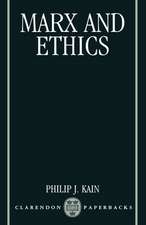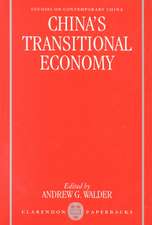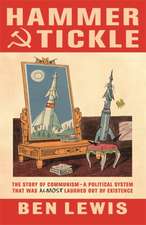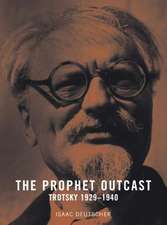Communism and the Emergence of Democracy
Autor Harald Wydraen Limba Engleză Paperback – 16 feb 2011
| Toate formatele și edițiile | Preț | Express |
|---|---|---|
| Paperback (1) | 281.33 lei 6-8 săpt. | |
| Cambridge University Press – 16 feb 2011 | 281.33 lei 6-8 săpt. | |
| Hardback (1) | 521.60 lei 6-8 săpt. | |
| Cambridge University Press – 7 feb 2007 | 521.60 lei 6-8 săpt. |
Preț: 281.33 lei
Nou
Puncte Express: 422
Preț estimativ în valută:
53.86€ • 55.98$ • 44.65£
53.86€ • 55.98$ • 44.65£
Carte tipărită la comandă
Livrare economică 05-19 februarie 25
Preluare comenzi: 021 569.72.76
Specificații
ISBN-13: 9780521184137
ISBN-10: 0521184134
Pagini: 326
Dimensiuni: 152 x 229 x 17 mm
Greutate: 0.44 kg
Editura: Cambridge University Press
Colecția Cambridge University Press
Locul publicării:Cambridge, United Kingdom
ISBN-10: 0521184134
Pagini: 326
Dimensiuni: 152 x 229 x 17 mm
Greutate: 0.44 kg
Editura: Cambridge University Press
Colecția Cambridge University Press
Locul publicării:Cambridge, United Kingdom
Cuprins
1. Communism and democracy - a problematisation; Part I. The Experiential Basis of Communism and Democracy: 2. Revolutions, transitions, and uncertainty; 3. The political symbolism of communism; 4. Experiencing democratic transformations; Part II. Critical Events and their Symbolisations: 5. The rise of Bolshevik power; 6. The emergence of the Cold War; 7. The articulation of dissidence; 8. The collapse of communism; Part III. Democracy as a Process of Meaning-Formation: 9. The power of memory; 10. The future that failed; 11. Democracy as a civilising process.
Recenzii
Review of the hardback: 'This original and powerful interpretive account of important political transformations in the twentieth century applies, in a creative fashion, the theory of fluid conjunctures to the understanding of communism and the emergence of democracy. Harald Wydra argues that understanding political transformations needs to take into account the social experiences of people in the chaotic historicity of extraordinary situations. Such situations have a logic of their own, which guides action and produces acts of signification that sustain and express the formation of political consciousness.' Michel Dobry, Professor of Political Science, Sorbonne University, Paris
Review of the hardback: 'An impressive work that helps us look at the experience of communism and post-communism in a new light. This work represents a major contribution to our understanding of politics in the twentieth century.' Richard Sakwa, University of Kent
Review of the hardback: 'Even today, we still don't understand why and how Communism survived for so long only to collapse so quickly. Without encountering much resistance it exerted a huge impact on many people, even those most opposed to it. How was it possible that wide segments of the intellectual elite in Europe and around the world considered this ugly monster as the salvation of mankind? Harald Wydra's book, by his emphasis on the power of symbols and the significance of liminal situations, and especially his innovative anthropology of transformative experiences, brings us much closer to understanding.' Arpád Szakolczai, Professor of Sociology, University of Cork
Review of the hardback: 'This book is a compelling meditation on democracy set concretely in the history of European communism and its transformation. Placing culture, people and action at center stage, Harald Wydra's analysis is interpretive, scholarly and intelligent.' Michael Urban, Professor of Politics, University of Kansas
Review of the hardback: '… a joy to discover.' Political Studies Review
Review of the hardback: 'An impressive work that helps us look at the experience of communism and post-communism in a new light. This work represents a major contribution to our understanding of politics in the twentieth century.' Richard Sakwa, University of Kent
Review of the hardback: 'Even today, we still don't understand why and how Communism survived for so long only to collapse so quickly. Without encountering much resistance it exerted a huge impact on many people, even those most opposed to it. How was it possible that wide segments of the intellectual elite in Europe and around the world considered this ugly monster as the salvation of mankind? Harald Wydra's book, by his emphasis on the power of symbols and the significance of liminal situations, and especially his innovative anthropology of transformative experiences, brings us much closer to understanding.' Arpád Szakolczai, Professor of Sociology, University of Cork
Review of the hardback: 'This book is a compelling meditation on democracy set concretely in the history of European communism and its transformation. Placing culture, people and action at center stage, Harald Wydra's analysis is interpretive, scholarly and intelligent.' Michael Urban, Professor of Politics, University of Kansas
Review of the hardback: '… a joy to discover.' Political Studies Review
Descriere
This book connects the study of democratisation to the emergence and crisis of communism.

















